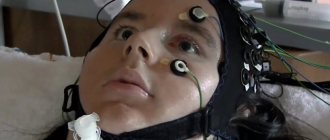What is deep sleep
Night rest accounts for about a third of a person’s life, 7-8 hours a day. This physiological process promotes recovery of the body and goes through 4 or 5 successive cycles of fast and slow phases.
The first (also paradoxical) takes up to 15 minutes. The second - orthodox or slow-wave sleep - lasts about an hour and a half, occurs immediately after falling asleep, and has 4 stages. The last one has the greatest effect on the body; the fourth one is deep or delta sleep.
Like deep sleep
What is deep sleep and what does it depend on? To answer this question, it is important to remember that both periods of sleep - fast and slow - are equally important for the full restoration of a person’s strength.
Memorization and processing of information occurs precisely in deep sleep mode. In other words, the effectiveness of the processes responsible for learning and mental development depends on the period of slow-wave sleep.
Complete relaxation of muscles also occurs in deep sleep, while the body's cells are actively restored, immunity is increased, and toxins and other harmful substances are eliminated.
Any disturbances and deviations in deep sleep will have a negative impact on a person’s performance and well-being.
The Importance of Deep Sleep
Why is the delta phase important in the process of night rest? During the day, the brain receives and processes a huge amount of varied information, and its memorization occurs in the delta phase. That is, the effectiveness of learning and the level of intellectual development directly depend on the quality and duration of deep sleep. In addition to transferring acquired knowledge from short-term memory to long-term memory, physiological processes are of great importance.
In the course of scientific research, it was found that maximum muscle relaxation is observed in the deep stage. At the same time, catabolism slows down and anabolism – the restoration of body cells – is activated. It removes toxins and other harmful waste products, and improves immunity.
Thus, a person fully rests during the period of delta sleep. A change in its duration or a failure of the entire cycle leads to chronic fatigue, drowsiness, a weakened immune system, and a decrease in intellectual abilities.
What happens during deep sleep?
During deep sleep, physical, psychological and physiological processes occur in our body:
- Release of growth hormone (GH)
, which helps your body grow and develop in youth and remains important in old age for cell repair and rejuvenation and tissue repair. - Memory consolidation
and transfer from short-term to long-term memory - No response to external stimuli
- it may be very difficult for a person to wake up from deep sleep; if awakened, they may be disoriented and feel sluggish - The immune system is strengthened.
- The muscles are relaxed, there are no eyes.
- Breathing slows, pulse and body temperature drop.
- Energy is restored the next day.
- The following parasomnias occur: bedwetting, sleepwalking, nightmares.
- Glucose levels in the brain increase.
- Decreased metabolism allows oxygen byproducts to cleanse our brains.
Structure
NREM and REM sleep alternate throughout the night cyclically. Falling asleep begins with the first, orthodox phase. It lasts about an hour and a half and takes place in four successive stages:
- Decreased alpha rhythm on the EEG, appearance of low-amplitude theta rhythms. At this time, the person is in a state of half-asleep, which may be accompanied by the appearance of dream-like hallucinations. Thought processes continue, manifesting as daydreams and reflections on the events of the day. Often there is a solution to pressing problems.
- The electroencephalogram records the predominance of theta waves, as well as the occurrence of characteristic increases in ri. At this, the longest, stage, consciousness turns off, the threshold of perception increases, but it is still possible to awaken the sleeping person.
- The appearance of high-amplitude delta waves on the EEG. In the third phase of slow-wave sleep (from 5 to 8% of the total duration) they take up less than half the time. As the delta rhythm predominates, the deepest delta sleep occurs.
- In the fourth phase, which accounts for up to 15% of the night's rest, consciousness is completely turned off, and it becomes difficult to wake up the sleeper. This period accounts for the majority of dreams; at the same time, the likelihood of manifestations of disorders (somnambulism, enuresis, nightmares) increases.
Sleep and intelligence decline in old age
Sleeping is also important because during the slow-wave and REM stages of sleep, memory consolidation —the transfer of information from short-term memory to long-term memory [16]. The hippocampus plays a key role in this process. The information that a person received while awake is “played out” several times during sleep in the form of a sequence of electrical impulses in the cells of the hippocampus, and then transmitted to the cerebral cortex (mainly the prefrontal cortex), where it remains for long-term storage. The transfer of information from the hippocampus to the prefrontal cortex during sleep is facilitated because the concentrations of cortisol and acetylcholine [17] (substances that inhibit memory consolidation) in the brain are reduced (Fig. 2).
Figure 2. Age-related changes in the activity of signaling from the hippocampus to the cerebral cortex during sleep. As we age, the proportion of slow-wave oscillations in total sleep time decreases, the prefrontal cortex gradually degrades, cortisol levels increase and acetylcholine concentrations decrease.
[18]
In old age, the process of memory consolidation occurs with less intensity [18] due to three features that were already mentioned above:
- the share of delta sleep in total sleep time decreases;
- cortisol production increases;
- The structure of the prefrontal cortex changes, its volume becomes smaller with age.
However, in older people who do not suffer from serious mental and intellectual impairments, sleep is no less important for memory consolidation than for young people. For example, both of these categories of people perform the task of remembering the location of objects better after sleep. The same cannot be said for older people with cognitive problems [19].
With motor memory the situation is somewhat different. Even in healthy older adults, sleep does not improve recall of a recently learned motor skill [20]. The exact reasons for this are unknown. Perhaps the fact is that in old age, memorizing sequences of movements deteriorates in any case, and against the background of this deterioration, the “help” of sleep in the memorization processes is not noticeable.
Normal duration
What is the norm for deep sleep? Its duration and quality are determined by the individual characteristics of the human body. For one, 4 hours of rest is enough, for another, to get enough sleep, you will need at least 10. The duration is also influenced by the age of the sleeper: in childhood it is up to 9-10 hours, in youth and maturity – about 8, and in old age it is reduced to a quarter of a day. The average ideal night's rest time is 7 or 8 hours, and the norm of deep sleep for an adult is determined by the percentage of phases.
If we take 8 hours of sleep as a basis, the duration of the deep period in a healthy person will average 20%. That is, in general it will take at least 90 minutes, and each of 4-5 cycles will take 20-25 minutes. When night rest is shortened or increased, the time of each phase decreases or increases accordingly. However, their ratio in percentage terms does not change, and the body recovers fully.
How long should deep sleep last?
The correct balance of deep and REM sleep is extremely important for quality recovery and rest.
For example, let's take the standard 8-hour sleep of an adult as a basis. At this duration, the period of deep sleep should be approximately 20 percent of the total.
The appearance of symptoms such as fatigue, a feeling of chronic lack of sleep, and weakness indicates insufficient sleep time.
The exact time a person will need for a quality night's rest will vary from person to person.
The normal sleep duration for an adult is 7-9 hours a day, but people over 65 will need 6-8 hours. Consequently, the norm for the duration of deep sleep for an adult is 100-120 minutes per day, and for older people - 75-85 minutes.
Processes in the body
The electrical activity of the brain is described in the corresponding section on sleep structure. How do all phases manifest themselves physiologically? As you begin to fall asleep, your muscles relax, your blood pressure and temperature drop, and your breathing slows down. In the second period, these indicators increase, but it is still possible to wake a person, despite the partial blackout of consciousness and an increase in the threshold for perception of external stimuli.
The deep phase, which combines the 3rd and 4th stages, is normally characterized by complete muscle relaxation and a slowdown of all metabolic processes. It is difficult to wake up, and physical activity indicates the presence of disorders.
Reasons for violations
Sometimes life circumstances require reducing the time of deep sleep (exam session or time pressure at work). A short-term increase in physical activity or mental activity is quickly compensated for. But if the duration of this phase decreases over time, chronic fatigue appears, memory deteriorates, and somatic diseases develop.
The reasons may be:
- psycho-emotional overload, stress;
- diseases of internal organs, nervous or endocrine systems;
- forced awakenings at night (with prostatitis to empty the bladder);
- arterial hypertension.
All these conditions require seeking medical help and treatment, since delta sleep is vital for a person.
How to normalize deep sleep
The deep sleep phase should be at least 20% of the total amount. If you experience chronic feelings of lack of sleep, weakness and fatigue, it’s time to think about increasing your total sleep time. It is important to follow a routine, try to stick to the chosen time for falling asleep and waking up. Physical activity during the day and a calm environment in the evening, combined with a light dinner, also help normalize sleep.
Good results are obtained by taking herbal remedies or melatonin-based medications if the disorder is not associated with physiological pathology. In some cases, taking medications as prescribed by a doctor is indicated. For this purpose, sedatives and hypnotics, calcium, magnesium and multivitamin complexes are used.
Characteristics of deep sleep
During the night's rest, slow-wave and fast-wave periods alternate with each other. The cycle consists of one period of slow and fast sleep. In total, four to six cycles change each night, lasting an hour and a half. For a child and an adult, the norm is that the deep period is thirty percent.
If a sleeper is abruptly awakened during the deep sleep phase, he will feel tired and exhausted during the day. People with hypertension may experience surges in blood pressure.
The peculiarity is that if a person sleeps well, he will wake up on his own in the morning even from a little noise, and getting up in the morning will be easy. During deep sleep, contact with reality is lost, the body completely relaxes, which gives it the opportunity to recover.
During such a rest, some changes occur in the body:
- muscles completely relax, metabolism slows down;
- At night, the parasympathetic part of the central nervous system is most active, so the pulse becomes slower, blood pressure drops, and the brain practically does not react to external stimuli;
- the gastrointestinal tract slows down its activity, so sometimes upon waking up you may feel slight nausea;
- the cells of the body are restored at night, as growth hormone is actively produced;
- the body expends much less energy than during the day;
- immunity is strengthened;
- If you sleep longer than usual, your physical capabilities increase.
REM sleep is the exact opposite of deep sleep. The body consumes a large amount of oxygen and glucose, breathing becomes more frequent, and the pulse increases. Women and men sometimes feel aroused and an erection occurs. Doctors advise sleeping at least seven hours a day. For children, pregnant women and patients with various diseases, this norm is higher.











